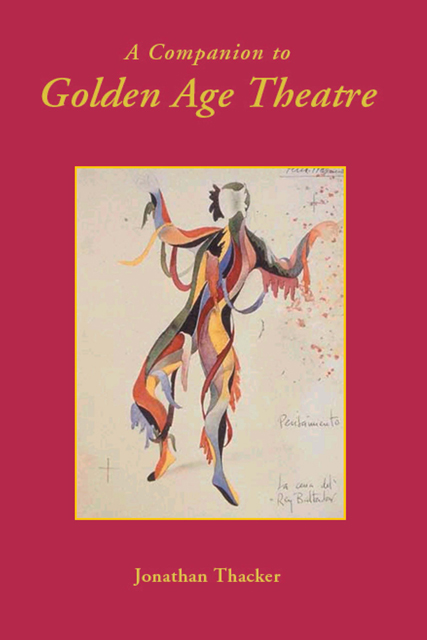Book contents
- Frontmatter
- Contents
- Dedication
- Foreword
- List of Abbreviations
- Introduction
- 1 The Emergence of the Comedia nueva
- 2 Lope de Vega
- 3 Cervantes, Tirso de Molina, and the First Generation
- 4 Calderón and the Comedia's Second Generation
- 5 Staging and Performance
- 6 Types of Comedia and Other Forms of Theatre
- 7 A Brief History of Reception
- Appendix 1 Verse Forms
- Appendix 2 English Translations of Golden Age Plays
- Suggestions for Further Reading
- Bibliography
- Index
4 - Calderón and the Comedia's Second Generation
Published online by Cambridge University Press: 09 May 2023
- Frontmatter
- Contents
- Dedication
- Foreword
- List of Abbreviations
- Introduction
- 1 The Emergence of the Comedia nueva
- 2 Lope de Vega
- 3 Cervantes, Tirso de Molina, and the First Generation
- 4 Calderón and the Comedia's Second Generation
- 5 Staging and Performance
- 6 Types of Comedia and Other Forms of Theatre
- 7 A Brief History of Reception
- Appendix 1 Verse Forms
- Appendix 2 English Translations of Golden Age Plays
- Suggestions for Further Reading
- Bibliography
- Index
Summary
Pedro Calderón de la Barca was born in Madrid in the year 1600 and was thus Lope de Vega's junior by a generation. The two dramatists coincided in writing for the stage from the early 1620s until Lope's death in 1635, more than enough time for Lope to become aware of the capabilities of this particular specimen of the ‘pájaros nuevos’, as the veteran called the fresh wave of poetas. Although he retained the basic structure of the comedia nueva as established by Lope and his contemporaries, it is certainly apt to denominate Calderón and his ‘school’ a second wave or generation of Golden Age dramatists. The differences in the form and style of Calderonian drama, and evolutions in its content, are striking, although whether one feels that through Calderón the comedia reaches its apogee is largely a matter of personal taste. Not all of the new developments can be ascribed to the influence of the poetry of Luis de Góngora (Lope's erstwhile rival, who had died in 1627) but the more recherché or culto linguistic legacy is plain to see in Calderón's verse, which scholars often label ‘gongorine’. There are also important changes in the theatrical world, particularly of the court under Philip IV (1621–65) and in the subsequent reign of Charles II (1665–1700), which influence the kind of entertainment produced by dramatists (see pp. 129–30).
A significant difference between Lope and Calderón is that the latter came from a family which, whilst not belonging to the upper echelons of the aristocracy, occupied a more elevated social position. Pedro's education with the Jesuits at the Colegio Imperial, then at Spain's best universities, Alcalá and Salamanca (whence he graduated in Canon Law in 1619), was the finest available and is inescapably influential in much of his dramatic output, especially the Corpus Christi autos, of which he was the acknowledged master. Don Pedro's status, such as it was, came from his father Diego's position as a government secretario, a post he had inherited from his own father. In 1623, several years after Diego's second marriage (1614) and death (1615), Pedro and his siblings sold their father's office for financial reasons.
- Type
- Chapter
- Information
- A Companion to Golden Age Theatre , pp. 92 - 122Publisher: Boydell & BrewerPrint publication year: 2007



